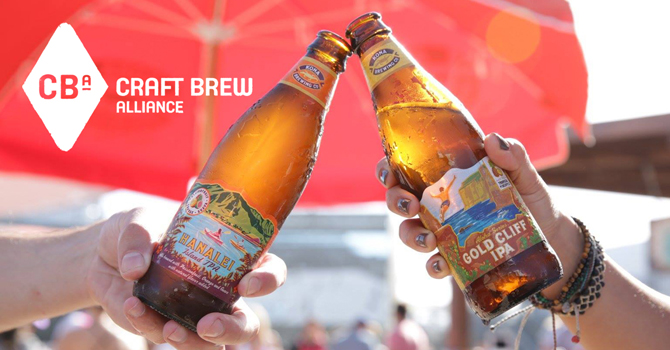
Craft Brew Alliance (CBA) today reported its 2018 and fourth-quarter financial results, which were highlighted by 8 percent full-year depletions growth for the company’s lead brand – Kona Brewing.
Despite the continued success of Kona, CBA’s total shipments, including beers produced under contract at its facilities, declined by 700 barrels, to 747,600 barrels, versus 2017, while depletions dipped 2 percent last year.
Nevertheless, beer net sales increased 1.3 percent, to $182.2 million, which the company attributed to stronger pricing.
However, overall net sales decreased 1 percent, to $206.2 million, which the company attributed to the closing of its Woodinville brewpub as well as $3.4 million in contract brewing shortfall fees from Pabst Brewing that did not recur in 2018.
“2018 was a banner year for CBA across many dimensions,” CEO Andy Thomas said via a press release. “Strategically, we accelerated Kona’s growth and continued our portfolio transformation by taking the next step and acquiring our craft partners. Operationally, we delivered record financial performance, despite absorbing partner acquisition costs and lapping $4.4 million in 2017 Pabst contract brewing fees. We are now in our strongest position ever to explore new frontiers of growth.”
Meanwhile, Kona depletions increased by 11 percent during the fourth quarter, while total net sales decreased 4 percent, to $44 million.
At the individual brand level, Kona shipments increased by 31,700 barrels in 2018, to 456,300 barrels, which the company attributed to the growth of Big Wave Golden Ale and Kanaha Blonde Ale.
The Kona brand now accounts for more than 63 percent of CBA’s total shipments (excluding beer produced for others under contract brewing arrangements).
But as the Kona brand grows, the company’s other core beer labels – Wider Brothers and Redhook – continue to struggle. Shipments of Widmer products declined 20 percent last year, from 123,300 barrels to 98,700 barrels, while shipments of Redhook declined more than 24 percent, from 94,200 to 71, 200 barrels.

The company attributed its Widmer and Redhook declines to decreasing sales of Widmer Hefeweizen and Redhook Longhammer IPA and ESB.
Shipments of the Omission, Square Mile Cider, Appalachian Mountain Brewing, Cisco Brewers, and Wynwood Brewing brand families grew by a combined 4,700 barrels, however, to 93,200 barrels. That piece of CBA’s portfolio now accounts for about 13 percent of total shipments.
Also of note, the company’s capacity utilization has declined 10 percent, to just 57 percent, over the last two years, which the company attributes to “a larger percentage” of its beer being made by Anheuser-Busch.
Recall that CBA has been working to “rationalize” its brewery footprint, an effort that most notably included the closure and subsequent sale of its Redhook brewing facility in Woodinville, Washington, in 2017.
As a result of that rationalization initiative, which includes the ability to produce upwards of 300,000 barrels annually at a Fort Collins, Colorado, brewing facility owned by Anheuser-Busch InBev (which owns 31.3 percent of CBA), the Portland-headquartered company said it “came closer to fully unlocking the estimated $3 million in annual cost savings in 2018.”
As part of its partnership with A-B, CBA is also producing Goose Island and Virtue Cider products at its Portsmouth, New Hampshire, and Portland, Oregon, breweries.
Additional details are included in a press release. A follow-up report will be published after the company’s earnings call tomorrow.
